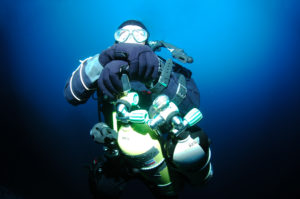Getting into technical diving can take a substantial commitment of time and finances, so you want to be sure you pick the right location, dive center and technical diving instructor. But how do you find this perfect person? Here are a few tips.
Finding the right technical diving instructor
Few budding divers research the instructor for their open-water class. Especially in vacation destinations, it’s often a case of striking up a conversation with an instructor in a particular dive center. You may enjoy the atmosphere and book there. Others choose a dive center because it’s located in their hotel. If you’re learning to dive at home there may only be one operator, so scheduling options might be limited. But most importantly, few open-water students know what questions they would ask of their prospective instructor.
When divers move on to technical diving, they already have a level of experience — of different instructors, dive centers and operators. This puts them in a much better position to ask the right questions and find the technical diving instructor that’s right for them. Here are few criteria that might help you find your ideal tech instructor.
Look for a coach and mentor
Technical diving training can be challenging, and courses sometimes run over the minimum number of dives a training agency requires. Similar to professional-diver training, you are looking for a coach and a mentor who will guide you there rather than someone who creates divers on a production line. Committed tech instructors often have long-standing relationships with their students. Many will come back for further training, join on dives, or simply get a piece of advice on their gear. Make sure your prospective instructor is approachable and available for these kinds of interactions.
Find out how they dive

What is their diving like? This may sound like a rhetorical question but check out whether your instructor still enjoys tech diving for themselves. Teaching, even at the top level of tech-diving training, can become routine. How much tech teaching or fun technical diving does your instructor do? Even the highest-level divers need practice to keep their skills sharp. It’s key for instructors to develop their diving to help them enjoy passing on skills and knowledge to others For example, it will be almost impossible for someone who teaches two tech courses a year and doesn’t practice their skills outside of that to remain in shape.
Explorers vs. educators
TDI published an article on choosing between ‘explorers’ and ‘educators’ when it comes to looking for a technical diving instructor. It’s a great distinction and one that illustrates where your instructor’s interests lie. Arguably, a combination of both is best — as a diver, you will benefit from learning from an explorer, but as a student, you can learn from someone who enjoys passing on knowledge.
So, how do you find out about all of these things? Ask questions. Booking a tech course should involve more than a few emails back and forth, although they may be so detailed that all is clear after a several exchanges. Most tech shops have fairly small instructional teams, so you’re likely talking with one of the people who will train you. Ask about their experience. Check them out on social media and see if there is a profile on the dive shop’s website. Maybe you can meet them before the course at a local dive show.
Where should you learn?
This leads us to the choice of location. There are a few valid approaches to this decision. First, where will you conduct your technical dives after the course? Can you take your initial courses there? Learning in the environment that you will be diving in after the class is a straightforward solution.
However, it’s perfectly possible to take courses in one environment and transition to another. The key is taking the time to adapt to different conditions and environments and getting some local advice. Assuming you took your courses in the tropics in a wetsuit and used aluminum tanks but are now looking at diving the wrecks in the Great Lakes, you’d need to practice buoyancy with steel tanks and become comfortable in a drysuit.
Light systems are another consideration: while even deep reefs in Indonesia, for example, don’t often require strong lights, any dive in the Great Lakes will. Transitioning from cold water to the tropics means that dehydration becomes a larger consideration and aluminum tanks will create additional positive buoyancy toward the end of a dive.
Summing it all up, what is the key to finding the perfect technical diving instructor? Most importantly, ask questions. Find out about your prospective instructor, including their approach to teaching and to their own learning. Inquire about their diving outside of teaching and anything else you would like to know before starting a course. Make sure you feel comfortable with them. Finding the right technical diving instructor can make the transition to this type of diving a little less daunting and a lot more exciting.

